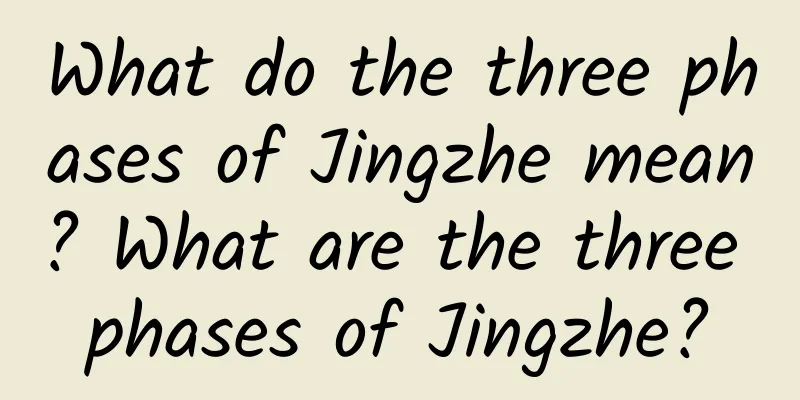What do the three phases of Jingzhe mean? What are the three phases of Jingzhe?

|
The Jingzhe solar term means that the weather starts to warm up and spring thunder begins to sound, awakening hibernating animals in the ground. It also reflects the phenomenon that natural organisms sprout and grow under the influence of rhythmic changes. Jingzhe, also known as "Qi Zhe" in ancient times, is the third solar term in the 24 solar terms of the lunar calendar. So, what are the three phases of Jingzhe? Please follow the Encyclopedia Knowledge Network and take a look! Contents of this article 1. What does the three signs of Jingzhe mean? 2. What are the three phases of Jingzhe? 3. Traditional customs of the Jingzhe solar term 1What does the three signs of Jingzhe mean?The ancient Chinese divided the Waking of Insects into three stages: "The first stage is when peach trees begin to bloom; the second stage is when orioles sing; the third stage is when eagles transform into doves." The flower corresponding to the first stage is peach blossom, the second stage is apricot blossom, and the third stage is rose. 2What are the three phases of Jingzhe?First phase: peach blossoms On the day of Jingzhe, "peach trees begin to bloom". The peach trees are young and lush, and their flowers are bright and beautiful. It is the beginning of spring. The red peach blossoms are tender, the green willow leaves are new, and the flowing peach blossoms attract people with all kinds of charm. Second phase: Cang Geng Ming Five days after the Waking of Insects, "the oriole sings". The oriole is the first to feel the spring sunshine and sings to seek friends. Cang means green, green means clear, and Geng means renewal. "When I said goodbye, the oriole kept singing", so literati also called it "Lihuang". "Lihuang sings intermittently through the trees" has become a sad sound. The third phase: The eagle transforms into a dove Five days later, the eagle turned into a dove. The ancients called the dove a cuckoo. In mid-spring, because its beak was still soft and it could not catch birds, it stared with its eyes wide open, enduring hunger, and turned into a fool. In autumn, the dove turned into an eagle again. 3Traditional customs of the Jingzhe solar term1. Express inner resentment: Many people have deified "beating villains", but in fact, this is purely a folk custom. The purpose of beating villains is to drive away villains and plague gods around by beating paper dolls representing enemies, and to vent inner dissatisfaction. Most people beat villains to pray for everything to go well in the new year, without villains causing trouble. The targets of "beating" are mainly mistresses and "golden fingers" at work. The purpose of beating villains is to hope that they will give up when they see difficulties and to express personal inner resentment. 2. Offering sacrifices to the White Tiger to resolve disputes: According to Chinese folklore, the White Tiger is the god of gossip and disputes. Every year, it comes out on this day to hunt for food and bite people. If you offend this, you will be bullied by evil people throughout the year, and your future development will be hindered, causing you all kinds of misfortunes. In order to protect themselves, people offer sacrifices to the white tiger on the day of Jingzhe. The so-called sacrifice to the white tiger refers to offering sacrifices to a white tiger drawn on paper. The paper tiger is usually yellow with black stripes and has a pair of fangs at the corners of its mouth. When offering sacrifices, it is fed with fat pig blood so that it will not hurt people after it is full. Then, raw pork is smeared on the mouth of the paper tiger so that it is full of oil and water and cannot speak ill of others. 3. "Beating the villain" drives away bad luck: Jingzhe symbolizes the beginning of February. It is like thunder that awakens all hibernating snakes, insects, rats and ants. The reptiles and ants in the house will respond and look for food everywhere. Therefore, in ancient times, on the day of Jingzhe, people would hold fragrant incense and wormwood and fumigate the four corners of the house to drive away snakes, insects, mosquitoes, rats and musty smells with the fragrance. Over time, it gradually evolved into a habit for those who are unhappy to slap their opponents and drive away bad luck, which is the predecessor of "beating villains". Therefore, an interesting scene would appear on the day of Jingzhe every year: a woman would hit a paper doll with a wooden slipper while chanting a spell to beat the little man: "I'll beat your head until you are so angry that you can't even breathe, and I'll beat you until you vomit even your relatives." |
<<: What is the significance of Jingzhe? How to bring good luck during Jingzhe?
Recommend
Pictures of Trichomonas vaginitis
Candidal vaginitis refers to a type of Trichomona...
Is it possible to get pregnant with one bar?
I think many women who are preparing for pregnanc...
[Medical Q&A] What are the dangers of babies being infected with hepatitis B virus?
Author: Hu Fang, deputy chief physician of Guangz...
Pregnant woman with yellow urine will give birth to a boy or a girl
The color of a pregnant woman's urine can det...
How long does it take to get your period after stopping birth control pills?
In order to avoid pregnancy, many women choose to...
Reasons for early menstruation
The situation of menstruation really varies accor...
How long can I have sex after hysterosalpingography?
If the uterus and fallopian tubes are blocked, it...
Is a woman pregnant if she feels hot all over?
In real life, it is a common condition to feel ho...
Do I need to take medicine for menopausal hypertension?
Hypertension stage 1 is also called mild hyperten...
Can I get an abortion if I find out I'm pregnant 20 days after sex?
Many women don't take good care of their bodi...
What should women with qi deficiency eat?
In life, many women always feel weak and tired wi...
I don't allow you to not know this way to eat pineapple without pricking your mouth (not soaking in salt water)
It’s the season to show off pineapples again! Do ...
What is the reason for excessive vaginal discharge four months after giving birth?
Many women will experience an increase in leucorr...
Can you have sex the day before abortion?
There are many things to pay attention to before ...
What causes a lump in the breast
Female friends may find lumps in their breasts. G...









